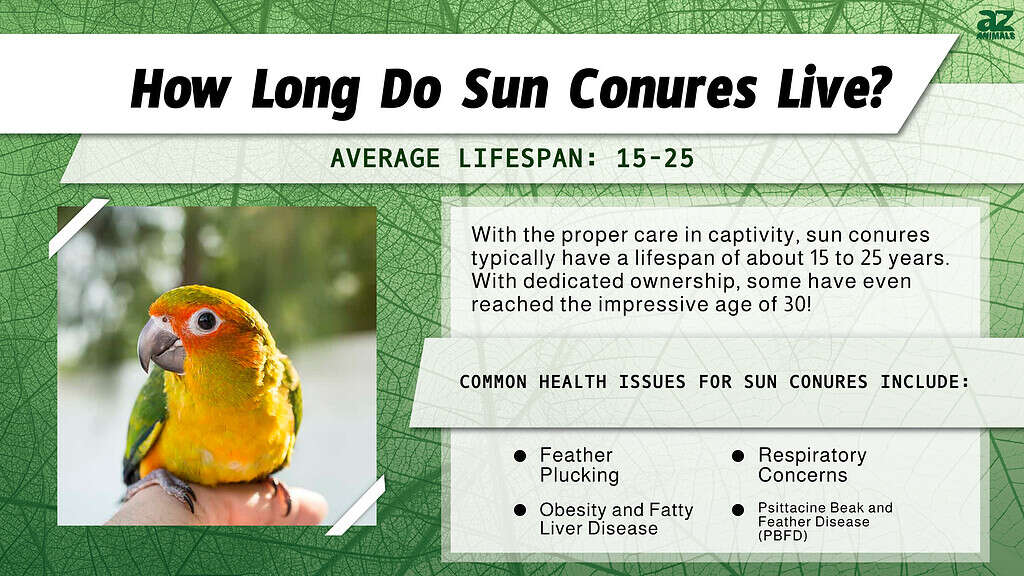
With their radiant plumage shimmering in sunset orange, yellow, and red hues, it’s easy to see why sun conures have become cherished companion birds for pet owners. Their energetic, clownish antics and strong bonds with their human flock mates offer delightful companionship. Yet, questions about sun conure lifespan and longevity inevitably arise for those considering welcoming one of these tropical birds into their home. How many years can a devoted owner expect to enjoy with their vibrant feathered friend? Let’s explore what’s known about the life expectancy of these charismatic small parrots.
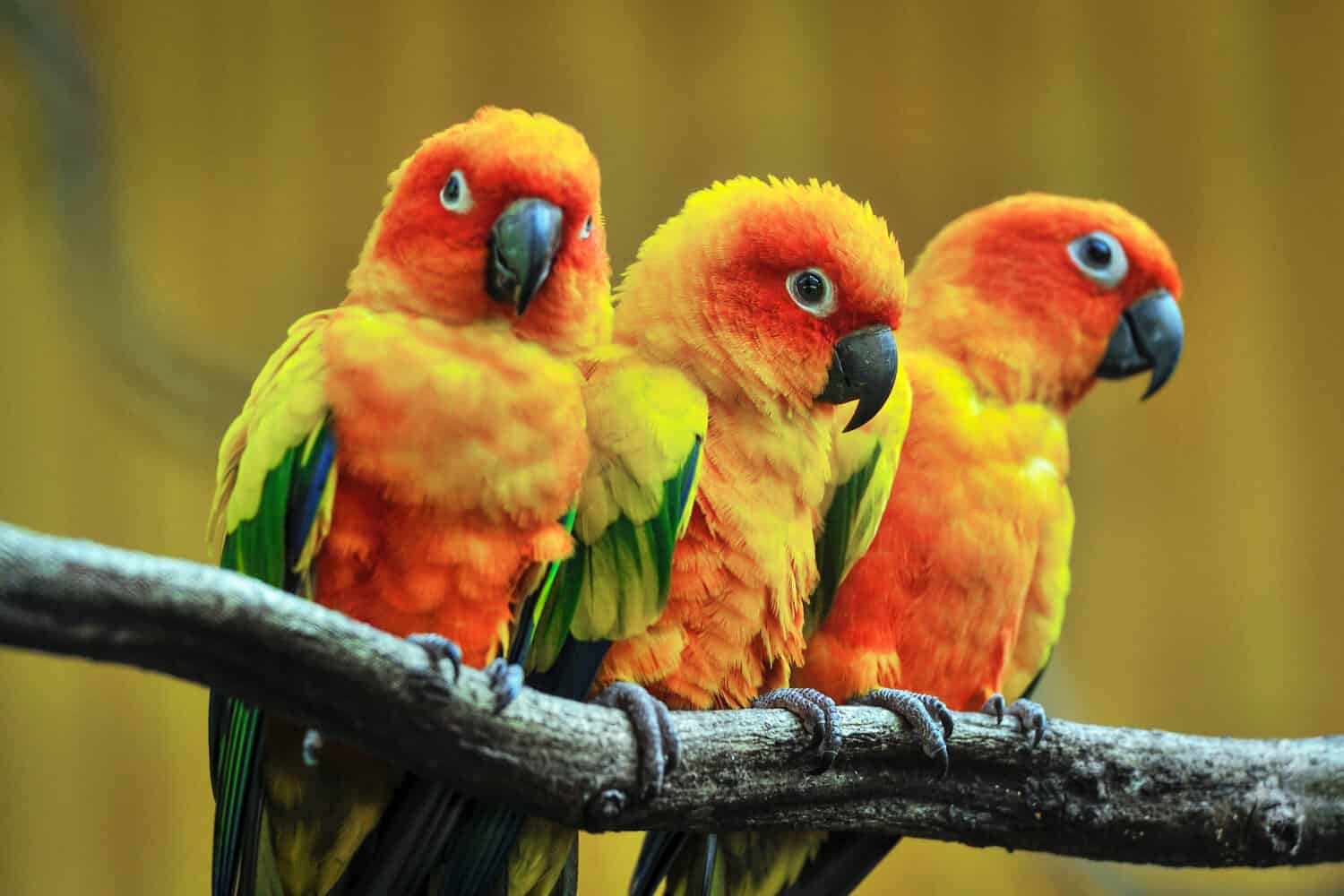
The lifespan of a sun conure is 15-25 years.
©Yatra4289/Shutterstock.com
Sun Conure Lifespan: Average Lifespan and Influencing Factors
Under proper care in captivity, a sun conure can be expected to live approximately 15-25 years on average. However, some have reached the ripe old age of 30 with a diligent owner committed to their well-being. Several key factors influence the longevity of sun conures:
Diet plays a critical role in longevity. Like humans, sun conures need balanced nutrition, including proteins, complex carbohydrates, fruits, vegetables, and healthy fats. Various fresh produce and a quality seed mix or pellet formula should be offered daily. Clean, fresh water must always be available. Limiting sugar and avoiding potentially toxic foods like chocolate or avocado is also important.
Mental and physical enrichment keeps sun conures active and engaged. These intelligent, high-energy birds need ample space for flying and climbing. An assortment of toys should be rotated frequently to pique their curiosity. Puzzles and training sessions provide mental stimulation. Perches of varying textures and diameters exercise their feet. And, of course, regular interaction with their human flock is essential. A bored, lonely bird is a stressed bird.
Preventative health care contributes significantly to longevity. Annual veterinary exams allow early detection of any emerging conditions. At home, owners should watch for signs of illness and be prepared to promptly intervene at the first sign of trouble. Some birds are genetically predisposed to live shorter or longer lives, but diligent care can help maximize an individual bird’s potential.
Proper husbandry and housing also affect sun conure lifespan. This means providing an appropriately sized cage, maintaining rigorous cleanliness, allowing adequate sleeping time in a dark, quiet space, and keeping the bird in a safe, temperature-controlled environment.
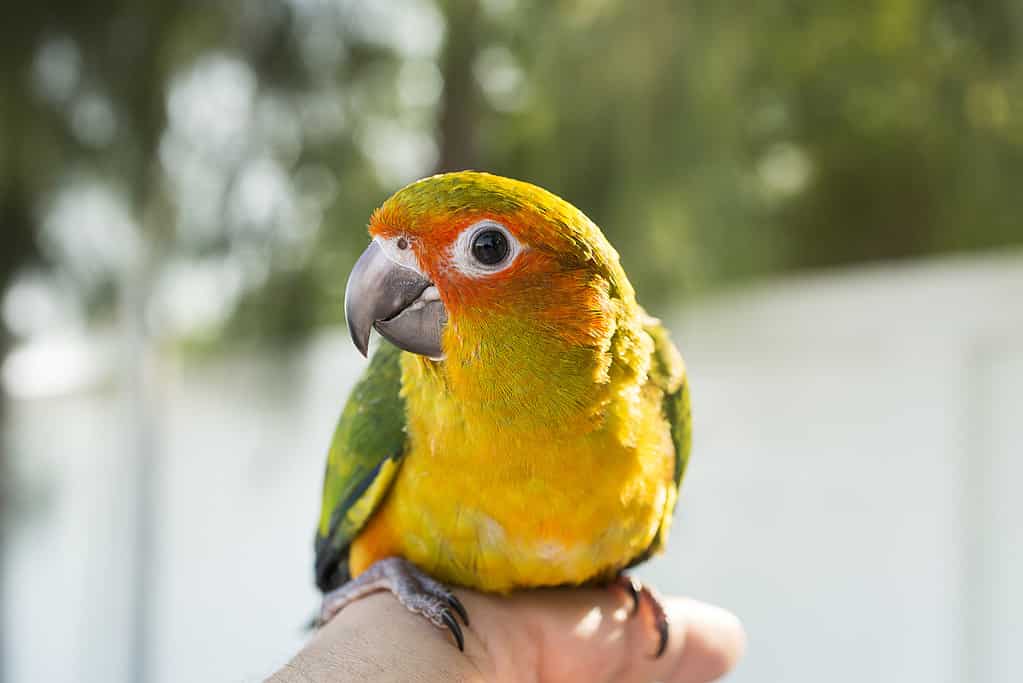
Proper care and maintenance is critical for a sun conure.
©iStock.com/Thirawatana Phaisalratana
Care and Maintenance: Nutrition, Enrichment, and Veterinary Care
Caring for a sun conure is a long-term endeavor requiring both dedication and attentiveness. But it also brings the reward of many years of companionship with these remarkable birds. Here are some key elements of sun conure care and maintenance:
Proper Nutrition is Critical to Maximize Your Sun Conure Lifespan
A balanced diet high in plant matter should be offered daily. Leafy greens like kale, spinach, broccoli, bell peppers, apples, and oranges provide beneficial vitamins and minerals. Cooked brown rice or quinoa offer healthy carbohydrates. A pelleted formula or seed mix can be given in moderation due to the high-fat content. Clean, fresh water must be constantly available. Toxic foods like chocolate, caffeine, alcohol, and avocado should never be given.
Keep Your Bird Busy
Keeping a sun conure’s bright mind active and engaged is also essential. Rotate an array of bird-safe toys frequently to pique their natural curiosity. Offer toys with different textures, materials, motions, and challenges. Shreddable and chewable toys satisfy their instinct to tear things apart. Bell and hole-containing toys create enticing sounds. Swinging toys and ladders promote climbing and exercise. Varying perch types also exercise feet and prevent pressure sores.
Keep Up With Preventative Care
Preventative care through regular veterinary check-ups can identify emerging health issues early when they are most treatable. Annual exams and diagnostic testing establish a baseline for comparison. Monitor the bird’s appetite, activity levels, and droppings at home daily. Any significant changes could indicate illness and warrant a prompt vet visit. Being proactive helps avoid minor issues from becoming major crises.

Knowing about a sun conure’s potential health issues prior can help with preventative care.
©Srimanta Khadanga niku, CC BY-SA 4.0 <https://creativecommons.org/licenses/by-sa/4.0>, via Wikimedia Commons – License
Health Considerations: Common Issues and Preventive Care
While sun conures are generally quite hardy, there are some health conditions owners should be aware of:
Feather Plucking
Feather-damaging behavior like plucking indicates boredom, stress, or psychogenic factors. Enrich the bird’s environment with more toys, training, and interaction. Identify and address potential stressors. Keep in mind, consulting an avian vet often helps resolve this issue.
Respiratory Concerns
Respiratory infections can become serious quickly in birds. Avoid drafty areas and rapid weather changes. Quarantine new bird introductions. Replace cage lining regularly. Also, annual exams ensure the bird isn’t carrying latent infections.
Obesity and Fatty Liver Disease
Monitor diet and activity levels to maintain an ideal weight. Restrict high-fat treats. Also, provide ample opportunity for exercise and flight.
Psittacine Beak and Feather Disease (PBFD)
Isolate any affected birds. Thoroughly sanitize cages, toys, and surfaces to prevent spread. Stress and poor diet may suppress the immune response to the PBFD virus.
Egg binding or dystocia. Verify adequate calcium intake. Allow unrestricted exercise and movement. Limit petting near the vent area. Additionally, monitor for signs of egg-related issues.
The key to addressing these health concerns is prevention. Robust nutrition, enrichment, exercise, low stress environment, and regular vet visits greatly reduce risks. Additionally, owners should watch closely for any behavior, appetite, or droppings shifts that could indicate illness. Quickly consulting an avian vet at the first sign of trouble provides the greatest chance of successful intervention.
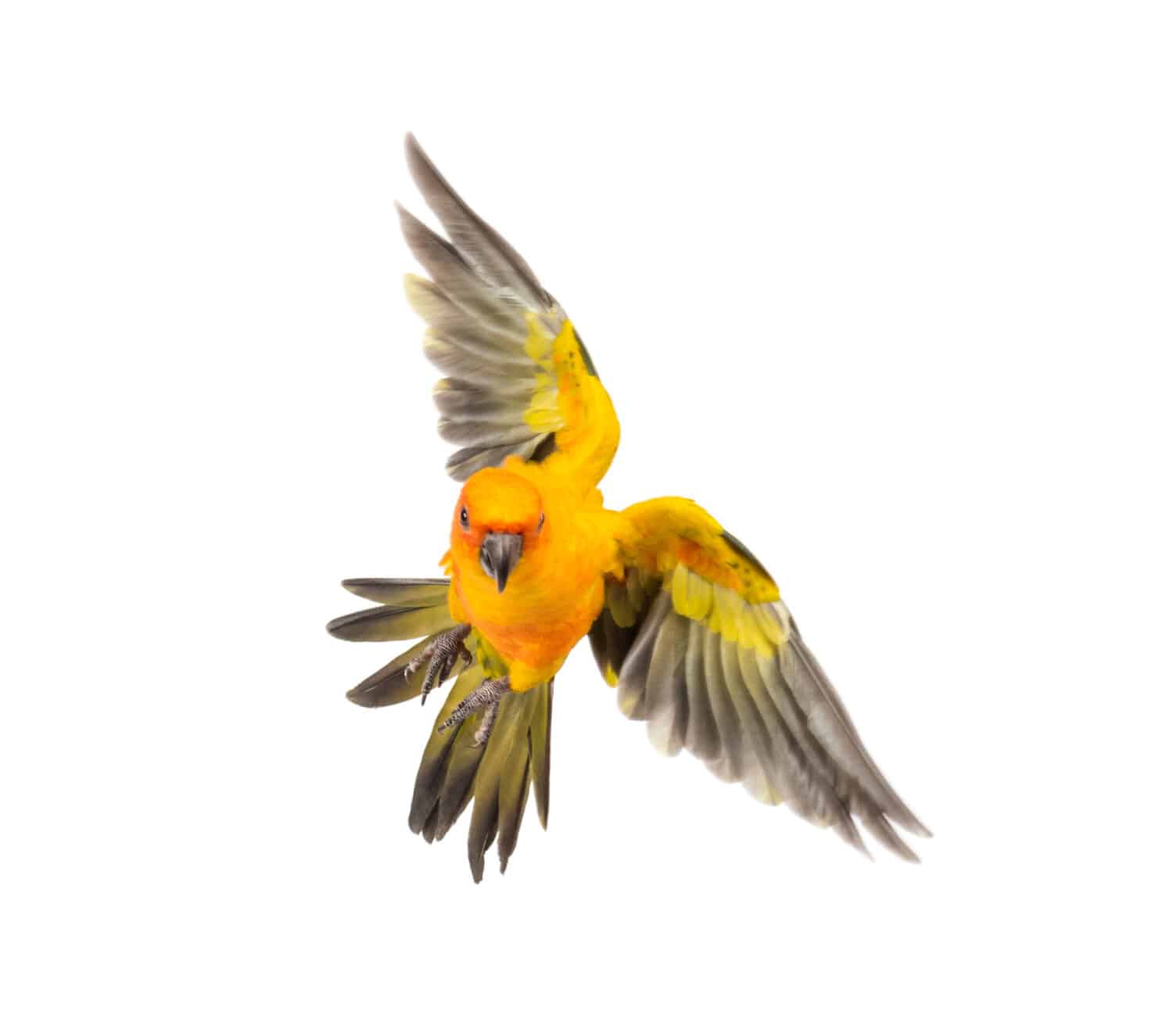
A healthy environment is vital for a sun conure pet bird.
©Eric Isselee/Shutterstock.com
Promoting Longevity: Creating a Healthy Environment
In addition to diligent care of their physical and mental needs, creating a safe, low-stress environment significantly promotes sun conure longevity. Some important environmental considerations include:
Proper Housing
Housing sun conures in an appropriately sized cage allow comfortable movement and short flights to exercise their wings. As a rough guideline, cages should be 18 inches wide, deep, and tall. So, the bigger the cage, the better.
Clean Cage Regularly
Keeping the cage clean reduces disease risks. Replace soiled cage liners daily. Disinfect and wash food/water containers daily. Anything the bird chews or touches regularly should be cleaned at least weekly.
Provide Sufficient Lighting
Providing adequate lighting allows birds to synthesize essential vitamin D from UV rays. But they also require 10-12 hours of uninterrupted darkness for sleep. Use cage covers to block light at night.
Ensure Proper Cage Placement
Situating the cage away from high traffic areas, direct drafts, noise, and temperature extremes reduces stress. While sun conures are noisy, themselves, loud ambient noise stresses them.
Routines are Vital
Maintaining consistency in routines provides a sense of security. Try to offer meals, interaction time, and sleep intervals at regular times.
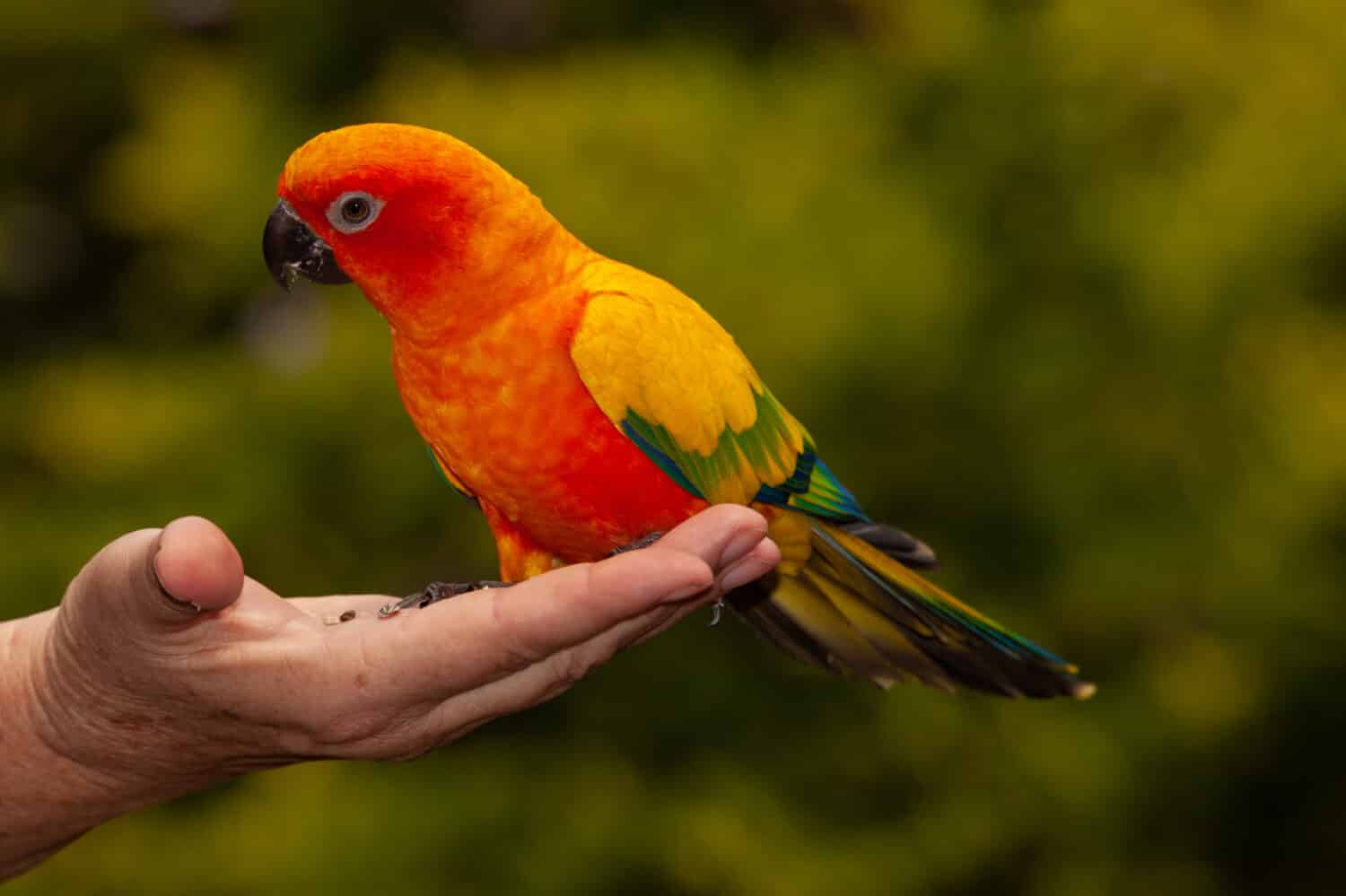
You can develop an emotional bond with your pet sun conure.
©mark higgins/Shutterstock.com
The Emotional Bond: Understanding Your Sun Conure’s Needs
While diet, housing, enrichment, and veterinary care significantly impact lifespan, understanding the emotional needs of sun conures is equally important. Sun conures form strong social bonds with their owners and require regular interaction and companionship. Not to mention, they thrive on frequent play time, training sessions, cuddling, and being involved in family activities. Investing the time to understand a bird’s unique personality pays dividends in terms of its emotional well-being and quality of life.
Conclusion
With attentive daily care and whole-hearted commitment, owners can expect over 15 years of devotion from a sun conure. Some have lived more than 30 years with diligent owners committed to their health and happiness. The keys to lengthen the sun conure lifespan are providing an excellent diet, enrichment, veterinary care, housing, and friendship. Watch closely for signs of illness and address them promptly. Respond to problematic behaviors early. And shower them with the same love and companionship they offer. Each year spent with a sun conure’s radiant spirit is a precious gift.
The photo featured at the top of this post is © Eric Isselee/Shutterstock.com
Thank you for reading! Have some feedback for us? Contact the AZ Animals editorial team.






